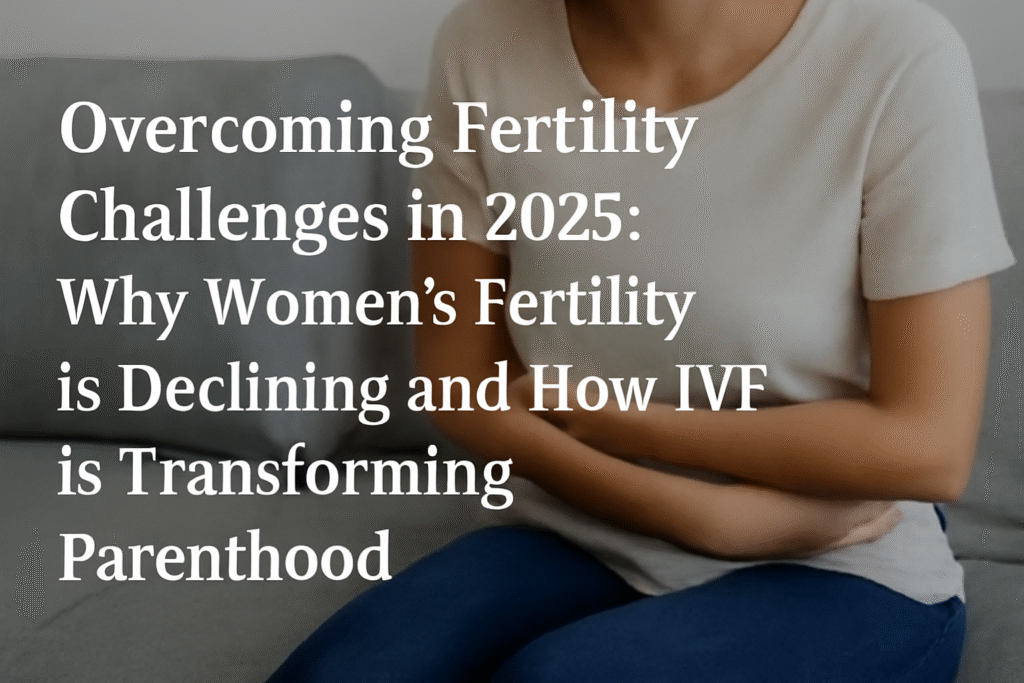Discover why women’s fertility rates are declining and how modern challenges like hormonal imbalances, lifestyle choices, and late marriages impact reproductive health. Learn how IVF is offering hope and solutions for those struggling with infertility in 2025.

As we get closer to World IVF Day 2025, it’s important to know about the problems women are having with getting pregnant. It’s clear that something big is changing because more and more couples are choosing assisted reproductive technologies, specifically in vitro fertilization (IVF). In this blog, we’ll talk about why women’s fertility is going down, the main reasons for this change, and how IVF is changing the way people become parents.
The Drop in Women’s Fertility: A Growing Concern
1. Decrease in fertility with age
Age is one of the most well-known things that can impair a woman’s ability to get pregnant. Women are born with a set number of eggs, which decrease in quality and quantity as they age. After a woman is 35, her chances of getting pregnant naturally go down a lot. This decline in fertility becomes more noticeable after age 40. This decline is why more and more older women are turning to IVF for help.
Did you know?
Only about 5% of women will be able to get pregnant naturally by the time they turn 40.
2. Health problems and hormone imbalances
Hormonal health is very important for a woman to be able to become pregnant. Polycystic ovarian syndrome (PCOS), thyroid problems, and being overweight can all throw off the balance of hormones in the body, which can cause periods to be irregular and eggs to be of low quality. Stress, a poor diet, and not getting enough exercise can also make these health problems worse, which makes it difficult for women to become pregnant.
3. Marrying late and focusing on work
In today’s world, there has been a big change in culture. Many women now put their education, profession, and personal growth ahead of starting a family. This shift is empowering, but it also means that a lot of women are putting off getting married and having kids. The longer a woman waits to establish a family, the less likely she is to become pregnant naturally. This delay in establishing a family can make women less fertile by the time they are ready to have kids, even though it gives them more options.
How IVF is Changing the Way We Think About Fertility
The loss in natural fertility is becoming more and more worrying, but IVF has given many couples who are having trouble becoming pregnant a glimmer of hope. IVF works by stimulating a woman’s ovaries to make eggs. The eggs are then taken out, fertilized in a lab, and put back into the uterus.
Recent years have seen huge improvements in IVF technology. New technologies like freezing eggs, screening embryos, and evaluating genes have made things more likely to work. These technologies make it possible for women who may have had trouble getting pregnant naturally to have children. IVF has also provided many people and couples who would have stayed childless the chance to have children.
Success Rates and Things to Think About: It’s important to remember that IVF is not a sure thing, even though it has a high success rate. Age, egg quality, sperm quality, and overall health are still important for the success of IVF. Still, for many people, it is a life-changing choice.
Dealing with the real reasons why fertility is going down
IVF can help, but it’s crucial to deal with the problems that are causing fertility to drop. Here are some things you can do to boost your fertility:
- Early Intervention: Women should get professional help as soon as possible, especially if they are having trouble getting pregnant or have conditions like PCOS or endometriosis. Early diagnosis and treatment can help you get pregnant, naturally or via IVF.
- Eating a healthy diet, working out frequently, and controlling stress can all have a big effect on fertility. It is also essential to keep your weight in check and stay away from drugs and alcohol.
- Education and Awareness: It’s essential to know how age affects fertility, hormonal health, and lifestyle choices. Teaching women about their fertility window, the risks of waiting to get pregnant, and the treatment options that are available can help them make better choices and have better reproductive health.
Why World IVF Day is Important
Louise Brown, the first baby born by IVF in 1978, was born on July 25th, which is now World IVF Day. This day is not only a celebration of scientific advancement, but it also reminds us of the difficulties that many couples experience when they want to have a baby. It’s a chance to talk about the emotional, physical, and financial parts of fertility treatments and give people who are having trouble getting pregnant hope.
In conclusion, the drop in women’s fertility rates is a complex problem that is affected by several factors, including age, hormone imbalances, health problems, lifestyle choices, and late marriages. IVF has changed many people’s lives for the better, but it’s not the only option. To combat the fertility crisis, we need a holistic approach that includes early intervention, lifestyle changes, and increased knowledge about reproductive health.
As we commemorate World IVF Day 2025, let’s honor the progress made in reproductive medicine and promise to help individuals who are trying to get pregnant. IVF is more than simply a medical procedure; for many people, it is a way to become a parent that gives them hope.
If you’re thinking about IVF or having trouble getting pregnant, it’s never too early to talk to a fertility expert. Find out more about your possibilities and start your journey to becoming a parent now.
Also read: 5 Powerful Foods to Boost Your Liver Health and Keep It Strong
The Alarming Rise of Heart Diseases in India: Causes and Life-Saving Prevention Tips






Pingback: What Waking Up Between 3 AM to 5 AM Means for Your Health: Signs You Shouldn’t Ignore
Pingback: PM Modi Unveils Exciting Opportunity: 5 Prestigious UK Universities to Open Campuses in India After FTA Deal